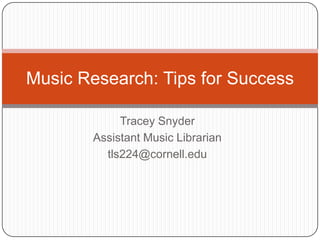Music Research: Tips for Success
- 1. Music Research: Tips for Success Tracey Snyder Assistant Music Librarian tls224@cornell.edu
- 2. About Google ? Use sparingly ? Consult Wikipedia article for overview ? Look at list of bibliographical references¡ªare they scholarly sources? If they are articles from magazines and newspapers, they may be of value, but they are not scholarly writings. ? A general Google search is all but useless for scholarly research, but tools like Google Books and Google Scholar have value.
- 3. Some Types of Research Tools ? Subject encyclopedias (Grove, Garland, etc.) ? Good starting point for getting background information ? Bibliographies (pub¡¯d separately, or with encyclopedia entry) ? Good starting point for choosing sources ? Periodical indexes/literature indexes (RILM, etc.) ? Good for discovering other scholarly sources on your topic ? Cornell¡¯s catalog and Cornell¡¯s articles tab ? Good for locating known items and discovering related items
- 4. Grove Music Online ? Access through Library Guide or Music Library home page ? Major scholarly reference source for topics in music¡ªuse in place of (or in addition to) Wikipedia ? Search for relevant entry ? Scan the bibliography, looking for items that are somewhat recent, and on topic
- 5. Cornell¡¯s Catalog (Books) ? Search title of overall work cited in Grove (or other) bibliography (not title of chapter) to locate it in the Cornell Libraries (or, can link to it from within Grove) ? Advanced Search works well for known-item searching
- 6. Cornell¡¯s Articles (Articles) ? Search title of article cited in Grove (or other) bibliography to access the article if available in electronic form ? Advanced Search works well for known-item searching ? * If the article is only available in print form, search title of journal (not title of article) in Cornell¡¯s catalog
- 7. ProQuest Dissertations and Theses ? Access to the full text of dissertations and theses by music scholars (soon-to-be faculty) ? Keep in mind that each of these scholars usually publishes a book based on the dissertation several years later¡ªsearch the author in the library catalog to find out if the book has been published yet ? Title usually differs somewhat ? Content is updated, so prefer the book over the dissertation
- 8. RILM and Music Index ? Indexes to the scholarly literature in the field of music ? Can be searched separately or simultaneously¡ª some overlap ? Why are these useful? ? Article-level/chapter-level indexing ? Variety of material types, including books, chapters, articles, dissertations, etc. ? Detailed subject headings ? Abstracts¡ªtruly helpful! ? Try out search terms as general keywords; can also specify to search for terms in abstract, subject heading, title, etc.
- 9. Finding More Articles ? In addition to RILM and Music Index, check for articles in: ? JSTOR ? Project MUSE ? RIPM (if appropriate) ? ProQuest Historical Newspapers (if appropriate)
- 10. Back to Cornell¡¯s Catalog and Articles ? RILM and Music Index often link directly to the article if it is available in electronic form (Get It! Cornell) ? If not, search in Cornell¡¯s catalog and articles tab, as before ? Use catalog for books ? Use articles tab for articles (in electronic form) ? Use catalog for journals (for articles in print form) ? Use ProQuest Dissertations and Theses (for dissertations)
- 11. Cornell¡¯s Catalog and Articles Again ? Try different keyword searches to discover more sources ? Catalog: When you find something promising, look at the subject headings, and use them in a new search to find similar items. (Click a subject heading, or enter terms in Advanced Search by Subject.) Also look at the call number (1st part before the period). ? Browse the call number range for similar books in ¡°Classic Catalog¡± interface, or, browse the shelves in the library (Reference and stacks) ? Ask a librarian for suggestions of call number ranges for your topic ? Articles: Browse subject headings etc. using the facets on the left; try out different possibilities
- 12. About Scholarly Research ? Search several different places for sources ? Search several different ways for sources ? Be prepared to spend time searching for, selecting, and locating sources ? Start searching early; allow time for requesting materials that are already checked out or are not yet owned by Cornell ? Ask a librarian or your instructor for help if you are getting stuck or feeling unsure about your results
- 13. In Summary ? Expect to see some of the same sources turn up in different places¡ªthat¡¯s a good thing ? Embrace serendipitous discoveries ? Think of searching for sources as an iterative process ? Find out about it ? Find it ? Find more like it












